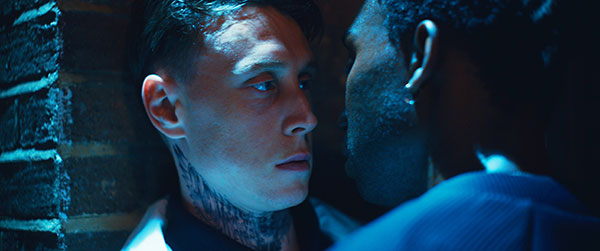Anchored by terrific performances and a flawless screenplay, the genre-defying Femme is a complex analysis of trauma, identity loss and internalised homophobia disguised as a revenge thriller.
When a short film is adapted into a feature, what we often get in the latter is a story that feels dragged-out, as it was never meant to be explored in that format. That is absolutely not the case for writers and directors Ng Choon Ping and Sam H. Freeman’s Femme, which was always meant to be a feature-length production. Their 2021 BIFA-winning short of the same name was only made in the attempt to find funding for the project they always had in mind — which is also, astonishingly, their debut film — and thank God they did, as Femme is a genre-defying gem of a movie brought to even higher heights by a tremendous screenplay, superb performances, and impressive technical execution.
In the past, we’ve seen many films use the world of drag queens to explore homophobia, abuse, toxic masculinity, and trauma. But Choon Ping and Freeman find a new way to tackle this subject, placing their protagonist right at the centre of a revenge thriller that soon evolves into something else as conventions are subverted and genres are blended. It’s a story that’s first and foremost about the loss of identity provoked by trauma, revolving around a brave young man who decides to take matters into his own hands to begin his journey of healing.
The young man in question is Jules (Nathan Stewart-Jarrett, of Misfits), and, when we first meet him, he is performing at a club as Aphrodite Banks, one of London’s most beloved drag artists. But when she steps out to get cigarettes, Aphrodite is first verbally assaulted and then brutally attacked by a gang of thugs, who strip her of her clothes — and, as a result, of her identity — and leave her there to deal with her actual and metaphorical bruises on her own.
When we next see Jules, months later, he no longer performs. He spends his days withdrawn from the world, playing videogames and avoiding his housemates Molly (Antonia Clarke) and Toby’s (John McCrea) attempts to help. One night, he goes to a gay sauna and recognises his attacker, who still looks as angry with the universe as he did that night, but who also doesn’t recognise Jules. Which represents an opportunity for our protagonist.

And so, fear turns into rage and then into resolve when our brave protagonist collects the courage to approach the man we’ll later come to know as Preston (George MacKay, of Wolf and The Beast) and follow him first to his car and then to his house, which becomes even more scary when Preston’s drug dealing, homophobic friends show up too. But Jules is determined to expose his closeted attacker to the world, and his plan to get revenge and closure is in motion. An affair begins between the two men, where each of them is hiding a secret from the other and their feelings towards one another are in constant flux, as are their own identities.
There are no heroes and villains in Femme, but only human beings trying their best to deal with their fears and trauma, and with whom we can always empathise while also recognising the gravity of their actions. With flawless sound design that heightens both protagonists’ emotions at exactly the right time, and camerawork that helps shift our perceptions of the characters as well as their own perceptions of one another, the film keeps us on our toes as to whether or not Jules will get his revenge in the end.
But there also comes a point where that won’t even matter anymore, as this gripping revenge thriller will have slowly but assuredly evolved into a completely different kind of film — a story that is, above all, about two confused people, where one is trying to find out who he is in the aftermath of trauma, and the other has suddenly become aware of his own wants and desires, and is even more terrified to face himself because of that.
As Jules and Preston, Nathan Stewart-Jarrett and George MacKay are exceptional. Stewart-Jarrett carries the film as its protagonist, inhabiting Jules with the right dose of anger, courage, and vulnerability and making us empathise with him at all times. George MacKay is given the impossible task of portraying two characters at once. The closeted Preston is a ticking bomb that could go off any time, and who can become extremely scary when he gets defensive. And then there’s the vulnerable one, who absolutely breaks our hearts with a disarming sweetness we didn’t think we’d ever see, which adds more layers to our perception of the character the more we get to know him. Not only that, but Preston is also a great source of comic relief, as his well-timed “thugness” in the first half of the movie brings many hilarious dynamics.

But the other star of the film is without a doubt its screenplay, as it was no easy feat to make a film about such a serious topic, with character dynamics that constantly evolve and different genres that are blended into one another, and still handle it with the respect it deserves. Choon Ping and Freeman absolutely succeed in this, making us feel so many different emotions throughout the film’s runtime and tackling internalised homophobia, trauma, and the long journey to healing: it’s ultimately a film about the broken victims of a system, who only realise what it is they need when they’re finally able to accept themselves.
Anchored by terrific performances and a screenplay that leaves room for empathy and humanity, Femme is a complex analysis of internalised homophobia and identity loss disguised as a revenge thriller, and an absolute must-watch at the Berlin Film Festival.
Femme premiered at the Berlin Film Festival on February 19-25 and is now available to watch on digital, on demand, and DVD/Blu-Ray in the UK, from Signature Entertainment, The film will be released in US theaters on March 22, 2024 from Utopia.

